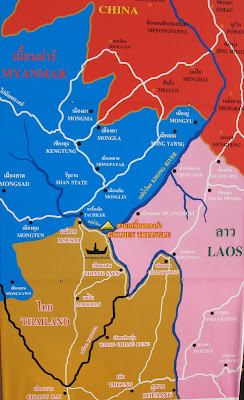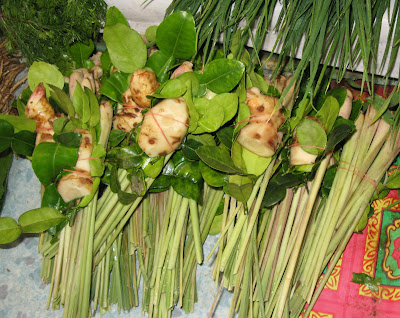.JPG)
The town is less developed, and certainly smaller than Chiang Mai. It had a tiny tourist section, a two-block-long length of street in the center of town, where several pizza joints, Italian food restaurants, and trinket shops catered to a small enclave of tourists. There was a decided lack of Thai restaurants, with the one exception of a food court with surrounding food stalls, but that only opened up at night, as part of the night market. One glance at the menus of the tourist places told us they were not as cheap as we had been lead to believe. We had to walk a few blocks away from the tourist area in order to find some local eateries, but even they were expensive by Thai standards.
.JPG) The guesthouse we booked for a week was typical of Thailand, which means the bed was extremely hard and the walls paper-thin. But it did have the bonus of being only a half-block from the night market, food court, and the bus station. It turned out to be a charming little three-story place with five rooms each on the second and third floors. We had found the place on a gay website, but near as we could tell we were the only gay couple there. Most of the staff were obviously straight, but it seemed that the owner (a Norwegian male) and the manager (a Thai male) were lovers, although that was never confirmed.
The guesthouse we booked for a week was typical of Thailand, which means the bed was extremely hard and the walls paper-thin. But it did have the bonus of being only a half-block from the night market, food court, and the bus station. It turned out to be a charming little three-story place with five rooms each on the second and third floors. We had found the place on a gay website, but near as we could tell we were the only gay couple there. Most of the staff were obviously straight, but it seemed that the owner (a Norwegian male) and the manager (a Thai male) were lovers, although that was never confirmed..JPG) One walk around the area made it clear that visitors stayed in and around the tourist area, and there was not much for them in the rest of town. It seems that most of the travelers who visit Chiang Rai, do so in order to take tours of the Golden Triangle, and they use Chiang Rai only as a base camp. After two or three nights, they journeyed on to their next destination.We spent our first two days in the town doing what we normally do. We walked the town looking for cool local shops and good places to eat whatever specialty the area had to offer. We visited all the Buddhist temples, wandered through the local markets, and bartered with the street vendors. It was fun exploring Chiang Rai, but it also had its drawbacks. Most of the locals there don’t speak English, and we don’t speak Thai. So if you wanted to eat somewhere other than one of the overpriced, mediocre international restaurants strewn around the Old Market area, you had to take your chances at one of the small local “hole in the wall” restaurants, which we did. More than once I ended up eating something I didn’t order. At night we ate at the food court, where we could get some fairly pricey Thai food, and ate while enjoying the nightly floorshow. The show consisted of traditional Thai dancers and two musicians.
One walk around the area made it clear that visitors stayed in and around the tourist area, and there was not much for them in the rest of town. It seems that most of the travelers who visit Chiang Rai, do so in order to take tours of the Golden Triangle, and they use Chiang Rai only as a base camp. After two or three nights, they journeyed on to their next destination.We spent our first two days in the town doing what we normally do. We walked the town looking for cool local shops and good places to eat whatever specialty the area had to offer. We visited all the Buddhist temples, wandered through the local markets, and bartered with the street vendors. It was fun exploring Chiang Rai, but it also had its drawbacks. Most of the locals there don’t speak English, and we don’t speak Thai. So if you wanted to eat somewhere other than one of the overpriced, mediocre international restaurants strewn around the Old Market area, you had to take your chances at one of the small local “hole in the wall” restaurants, which we did. More than once I ended up eating something I didn’t order. At night we ate at the food court, where we could get some fairly pricey Thai food, and ate while enjoying the nightly floorshow. The show consisted of traditional Thai dancers and two musicians..JPG) The problem came during the third day. The town was so small we completely walked every part of it in the first two days, and none of is was so memorable that we wanted a return visit. So we were enticed to take a tour to the Golden Triangle, even though we dislike taking organized tours.
The problem came during the third day. The town was so small we completely walked every part of it in the first two days, and none of is was so memorable that we wanted a return visit. So we were enticed to take a tour to the Golden Triangle, even though we dislike taking organized tours..JPG)
.JPG) (afternoon market)
(afternoon market).JPG) (Sala Lanka tree)
(Sala Lanka tree).JPG) (blossom of the Sala Lanka)
(blossom of the Sala Lanka)Our tour started very early the next morning by being crammed into a van with five other tourists, a driver and a guide who spoke broken English, then a long drive north through some lush, hilly country. We stopped a garden park, dedicated to the King’s mother, that was way over the top with different varieties of plants – everything from orchids to cactus. It felt like a botanical garden Disneyland. We then headed-off to Maesai, the northernmost tip of Thailand where we had a view into Myanmar. Next we visited an Opium museum, and learned more about the cultivation, production and smuggling of the white powder than I ever wanted to know.
.JPG)
.JPG)
.JPG) (the northernmost city in Thailand, Maesai)
(the northernmost city in Thailand, Maesai).JPG) (bridge leading from Thailand into Myanmar)
(bridge leading from Thailand into Myanmar)At last we approached the Golden Triangle, which is the spot where two rivers come together, forming the borders of Thailand, Burma, and Laos. It’s a beautiful setting, but there really isn’t much there to see. The fun part was climbing into a long-tail boat for a high-speed ride down the river to a Lao settlement. The village was very poor, and made money by selling trinkets to us tourists who came down the river. Still it didn’t quite seem like it was worth the five-hour drive just do a quick thirty-minute ride on the river.
.JPG)
.JPG)
.JPG) On the way back to Chiang Rai, we stopped at a hill-tribe village. We definitely had mixed thoughts about the visit. These people are living in the poorest of conditions. The place was definitely set up for tourists but aside from our small group of seven there were none around.This particular encampment housed four different hill tribes, the Akha, Hmong, Lisu, and Karen. The each had their own staging area where they would perform a customary dance. All except the Karen, who were the most popular because of the brass rings the young women wear to stretch their necks.We came away from the Hill tribe encampments with mixed feelings. It's all a big show meant for the typical tourist, but it somehow felt a little embarrassing for us. The encouraged donations certainly benefited the people, as did the trinkets they had to sell. But how much of the ten dollar per person "visit" fee went to them? And how poorly would they live if no tourist visited them? As I say, it was somewhat embarrassing having these people put on a dog-and-pony show for us. On the other hand our visit was certainly an education on these very interesting, gentle people.
On the way back to Chiang Rai, we stopped at a hill-tribe village. We definitely had mixed thoughts about the visit. These people are living in the poorest of conditions. The place was definitely set up for tourists but aside from our small group of seven there were none around.This particular encampment housed four different hill tribes, the Akha, Hmong, Lisu, and Karen. The each had their own staging area where they would perform a customary dance. All except the Karen, who were the most popular because of the brass rings the young women wear to stretch their necks.We came away from the Hill tribe encampments with mixed feelings. It's all a big show meant for the typical tourist, but it somehow felt a little embarrassing for us. The encouraged donations certainly benefited the people, as did the trinkets they had to sell. But how much of the ten dollar per person "visit" fee went to them? And how poorly would they live if no tourist visited them? As I say, it was somewhat embarrassing having these people put on a dog-and-pony show for us. On the other hand our visit was certainly an education on these very interesting, gentle people. .JPG)
.JPG)
(A chedi at Wat Mahathat in Chiang Saen)
A funny thing happened the day after our Golden Triangle tour. We ran into our guide, the one who spoke broken English, on the streets of Chiang Rai. He was very gracious and led us to his home for a traditional snack, then took us to the market where we had lunch at a soup stall in the center of the market. We all had the curry noodle soup, a specialty of the area, served with crispy buffalo rind. It was tasty but there were some unidentified bits of animal organs hidden in the soup. We had a very pleasant afternoon with him showing us around the center of town, explaining to us which restaurants were good for which dishes, and what to look for in the various temples. The man had a wealth of knowledge, as you would expect from a guide. That actually wasn’t so funny, but what occurred the following days was. We kept running into him every time we when out strolling. It seemed he was stalking us. We literally couldn’t go out without “accidentally” running into him. It got to the point where I began looking around corners, trying to avoid him. It turned into a very entertaining game, tying to go a full day without seeing him.I must admit that after a full week, I was glad to leave Chiang Rai.
Chiang Rai time:
.jpg)
.JPG)
.JPG)
.JPG)
.JPG)
.JPG)
.JPG)
.JPG)
.JPG)